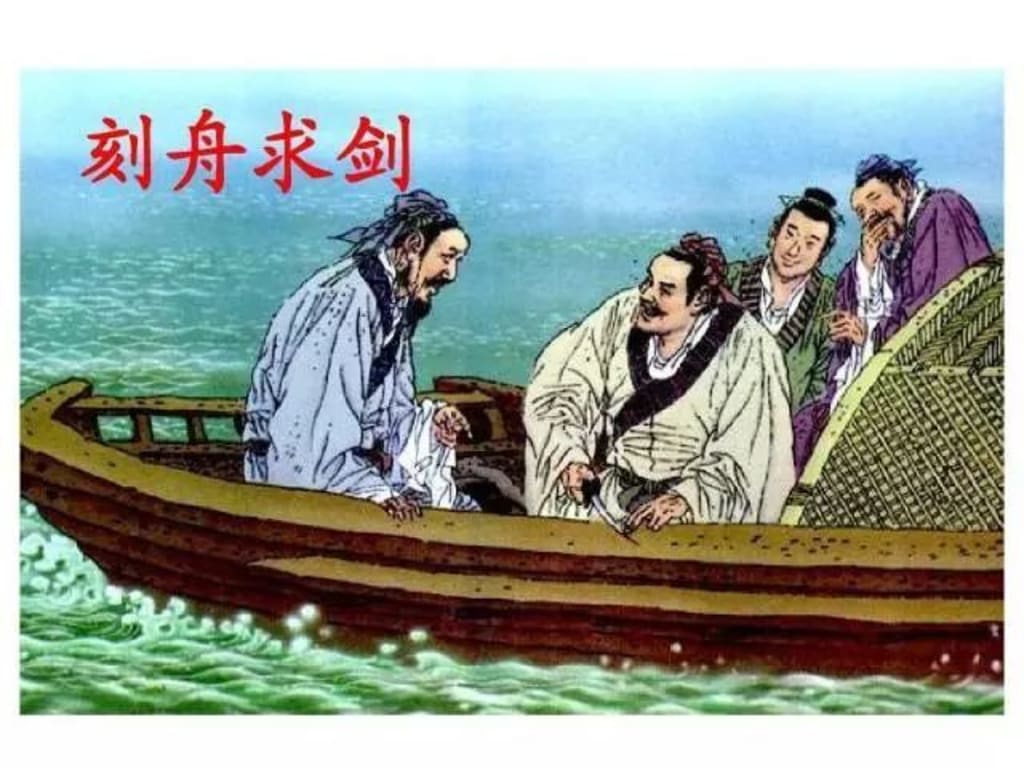
The story of "刻舟求剑" is a famous Chinese idiom that originated from a story in the Warring States period. The idiom means "to stick to an old way of doing things without considering the current situation."
The story goes that a man named Gongshu Ban was a skilled craftsman who was known for his ability to make weapons. One day, he was traveling across a river with a friend, and while they were crossing, Gongshu Ban accidentally dropped his sword into the water. His friend saw what had happened and pointed it out to him, but Gongshu Ban didn't seem to care and continued to cross the river.
When they reached the other side, Gongshu Ban immediately drew a knife and began to carve markings on the side of the boat. His friend asked him what he was doing, and Gongshu Ban explained that he was marking the spot where he had dropped his sword so that he could retrieve it later.
After they had traveled some distance, Gongshu Ban asked his friend to stop the boat and help him find the spot where he had dropped his sword. His friend was amazed at Gongshu Ban's insistence on finding the sword, even though they had already traveled so far and the sword was likely lost. However, Gongshu Ban was determined to find it and continued to search until he finally found it.
His friend asked him why he had gone to such great lengths to find the sword, and Gongshu Ban replied, "The sword is a precious weapon and it would be a shame to lose it. Even though it may seem impossible to find it now, I cannot simply give up without trying. This is like the story of 刻舟求剑. Even though the sword has fallen into the water, I know where it was, and that knowledge is valuable. It's like carving a mark on the side of the boat. Even though the sword is no longer there, I know where it was, and that knowledge is still useful."
The story of 刻舟求剑 has become a well-known idiom in China, and it is often used to describe situations where people are so focused on the past that they fail to consider the present. The lesson of the story is that sometimes, it is necessary to let go of the past and adapt to new circumstances in order to move forward.
The story of 刻舟求剑 has also been interpreted in different ways over the years. Some people see it as a cautionary tale about the dangers of being too attached to material possessions, while others see it as a story about the importance of persistence and determination. Regardless of how it is interpreted, the story has endured for centuries and continues to be a valuable lesson for people of all ages.
The story of "刻舟求剑" teaches us several important lessons:
1. Don't be too attached to the past: Gongshu Ban was so focused on finding his sword that he failed to consider the possibility that it was lost. This teaches us the importance of letting go of the past and adapting to new circumstances.
2. Persistence pays off: Gongshu Ban's determination to find his sword eventually paid off. This teaches us that if we persist in our efforts, we can achieve our goals.
3. Don't underestimate the value of knowledge: Even though the sword was no longer in the water, Gongshu Ban's knowledge of where it had fallen was still valuable. This teaches us the importance of knowledge and the role it can play in achieving our goals.
4. Don't take things for granted: Gongshu Ban's insistence on finding his sword shows us that we should not take things for granted, even if they seem insignificant or lost.
5. Be resourceful: Gongshu Ban's use of the knife to mark the spot where he had dropped his sword shows us the importance of being resourceful and using what we have to solve problems.
Overall, the story of "刻舟求剑" teaches us to be persistent, adaptable, and resourceful in our approach to solving problems and achieving our goals. It also reminds us of the importance of knowledge and not taking things for granted, and encourages us to let go of the past and focus on the present.






Comments
There are no comments for this story
Be the first to respond and start the conversation.